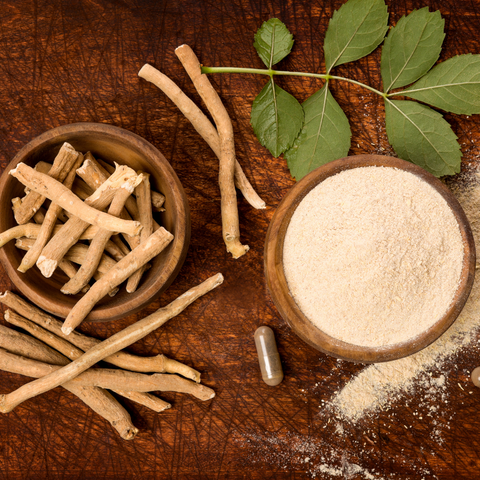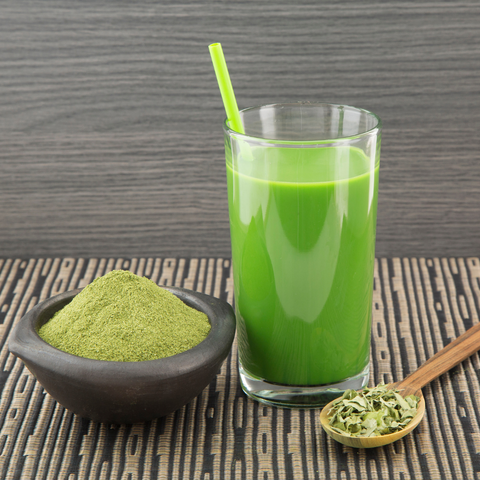Adaptogens are natural substances that can help the body adapt to stress, improve mood, and support overall health. These powerful herbs and mushrooms have been used for centuries in traditional medicine to help combat the effects of stress and promote wellness. In this article, we'll explore the top 3 African adaptogens and their benefits.
Ashwagandha
Ashwagandha, scientifically known as Withania somnifera, is a powerful herb that has gained recognition for its adaptogenic properties. Ashwagandha has been used for centuries in traditional Ayurvedic medicine for its ability to promote resilience and balance in the face of various stressors.
One of its primary adaptogenic mechanisms is believed to involve regulating the body's stress response by influencing the production of stress hormones, such as cortisol. By doing so, Ashwagandha may help reduce the negative effects of chronic stress on the body, promoting a more balanced and harmonious state.

Ashwagandha: Image from Canva
Moreover, Ashwagandha's adaptogenic properties extend beyond stress management to encompass a wide range of physiological functions. It is thought to enhance the body's immune response and promote overall immune system health.
Additionally, Ashwagandha is believed to possess antioxidant properties, helping to combat oxidative stress and protect cells from damage caused by free radicals. These many qualities contribute to Ashwagandha's reputation as a holistic herb that supports the body's ability to adapt and maintain equilibrium in the face of challenges.
Scientific research suggests that the herb may have neuroprotective effects. This means it could potentially protect neurons (nerve cells) in the brain from injury or degeneration, which involves preserving their structure and function.
Some studies also indicate its potential in improving energy levels, endurance, and athletic performance.

Athlete: Image from Canva
As interest in natural remedies for stress and overall well-being continues to grow, Ashwagandha stands out as a versatile herb with adaptogenic qualities that address various aspects of health, making it a popular choice for those seeking a natural approach to managing stress and promoting overall resilience.
Moringa Powder
Moringa powder comes from the leaves of the Moringa oleifera tree. It is gaining attention for its remarkable adaptogenic properties. Like Ashwagandha, Moringa is recognized for its ability to help the body adapt to stressors and maintain balance.
The plant has been used traditionally in various cultures for its medicinal properties, and modern research is shedding light on its adaptogenic potential.

Moringa Leaf Powder Smoothie: Image taken form Canva
Moringa has a rich profile of nutrients, including vitamins, minerals, and antioxidants, which collectively contribute to its ability to support the body in coping with stress and maintaining overall well-being.
One of the key ways in which Moringa displays its adaptogenic properties is through its impact on the immune system. Studies suggest that Moringa possesses the ability to regulate immune function and enhance the body's defense mechanisms. This can be particularly helpful during periods of stress when the immune system may be compromised.
Further, Moringa's antioxidant content plays a big role in neutralizing free radicals and reducing oxidative stress. By reducing oxidative damage, Moringa contributes to the body's natural ability to adapt. This potentially protects it against the negative effects of chronic stress.

My muesli bowl with Moringa Powder
Some research shows that Moringa may have anti-inflammatory properties. This reduces the inflammatory response often associated with stress-related conditions. Additionally, Moringa is known to have a positive impact on energy levels and may contribute to improved stamina and vitality. Moringa provides a nutrient-dense boost to support overall health and resilience.
Gotu Kola
Gotu Kola, scientifically known as Centella asiatica, is an herb with a long history in traditional medicine, particularly in Ayurveda and Traditional Chinese Medicine. Gotu Kola is also used in some African countries and is celebrated for its adaptogenic properties. It has a reputation as a rejuvenating herb for the mind and body.
The adaptogens in Gotu Kola are believed to help the body respond to stress by regulating the production of stress hormones like cortisol. This helps to promote a balanced stress response, potentially reducing the negative impact of chronic stress on overall health.

Gotu kola : Image from Canva
One of the notable ways in which Gotu Kola demonstrates its adaptogenic qualities is through its impact on cognitive function. Cognitive function means intellectual activity such as thinking, reasoning, or remembering. Studies suggest that Gotu Kola may have cognitive-enhancing effects meaning it could support memory and overall brain function.
Additionally, Gotu Kola is thought to have neuroprotective properties, which means it may help protect the brain from oxidative stress and inflammation. This dual action on cognitive enhancement and neuroprotection aligns with the adaptogenic nature of Gotu Kola. It assists the body in adapting to both internal and external stressors that may affect cognitive health.

Gotu Kola's adaptogenic properties extend beyond mental well-being to encompass physical health. It is believed to support the circulatory system by promoting healthy blood flow and strengthening blood vessels. This adaptogenic action is particularly relevant in the context of heart health.
Gotu Kola stands out as a versatile adaptogen that addresses both mental and physical aspects of health, contributing to a holistic approach to stress adaptation and resilience.
Conclusion
Adaptogens like Ashwagandha, Moringa, and Gotu Kola offer gentle, natural support for the body—especially during times of stress. Each of these plants helps in its own way, whether it’s balancing stress hormones, protecting the brain, supporting immunity, or boosting everyday energy. What they all have in common is their ability to help the body stay steady and resilient.
As more people look for natural ways to manage stress and improve their well-being, these African adaptogens continue to stand out for their long history and wide-ranging benefits. If you’re exploring simple, plant-based ways to support your health, these three herbs are a great place to start.
Let me know in the comments which adaptogen you’re most interested in trying next.
References:
https://www.ncbi.nlm.nih.gov/pmc/articles/PMC3252722/#:~:text=Being%20a%20powerful%20adaptogen%2C%20it,damage%20caused%20by%20free%20radical
https://www.ncbi.nlm.nih.gov/pmc/articles/PMC9108141/s.
https://www.ncbi.nlm.nih.gov/pmc/articles/PMC3359802/
